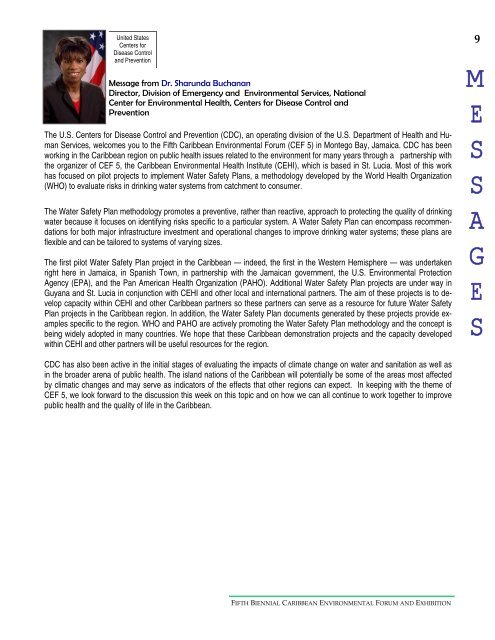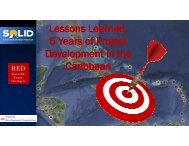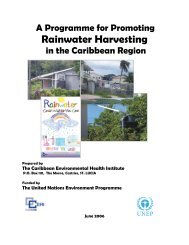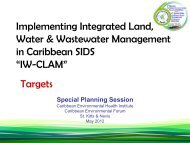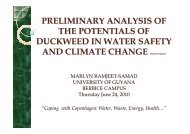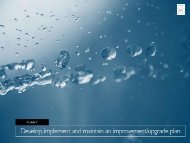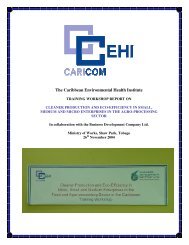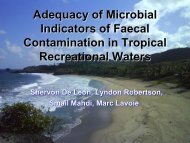conference magazine - Caribbean Environmental Health Institute
conference magazine - Caribbean Environmental Health Institute
conference magazine - Caribbean Environmental Health Institute
You also want an ePaper? Increase the reach of your titles
YUMPU automatically turns print PDFs into web optimized ePapers that Google loves.
United States<br />
Centers for<br />
Disease Control<br />
and Prevention<br />
Message from Dr. Sharunda Buchanan<br />
Director, Division of Emergency and <strong>Environmental</strong> Services, National<br />
Center for <strong>Environmental</strong> <strong>Health</strong>, Centers for Disease Control and<br />
Prevention<br />
The U.S. Centers for Disease Control and Prevention (CDC), an operating division of the U.S. Department of <strong>Health</strong> and Human<br />
Services, welcomes you to the Fifth <strong>Caribbean</strong> <strong>Environmental</strong> Forum (CEF 5) in Montego Bay, Jamaica. CDC has been<br />
working in the <strong>Caribbean</strong> region on public health issues related to the environment for many years through a partnership with<br />
the organizer of CEF 5, the <strong>Caribbean</strong> <strong>Environmental</strong> <strong>Health</strong> <strong>Institute</strong> (CEHI), which is based in St. Lucia. Most of this work<br />
has focused on pilot projects to implement Water Safety Plans, a methodology developed by the World <strong>Health</strong> Organization<br />
(WHO) to evaluate risks in drinking water systems from catchment to consumer.<br />
The Water Safety Plan methodology promotes a preventive, rather than reactive, approach to protecting the quality of drinking<br />
water because it focuses on identifying risks specific to a particular system. A Water Safety Plan can encompass recommendations<br />
for both major infrastructure investment and operational changes to improve drinking water systems; these plans are<br />
flexible and can be tailored to systems of varying sizes.<br />
The first pilot Water Safety Plan project in the <strong>Caribbean</strong> — indeed, the first in the Western Hemisphere — was undertaken<br />
right here in Jamaica, in Spanish Town, in partnership with the Jamaican government, the U.S. <strong>Environmental</strong> Protection<br />
Agency (EPA), and the Pan American <strong>Health</strong> Organization (PAHO). Additional Water Safety Plan projects are under way in<br />
Guyana and St. Lucia in conjunction with CEHI and other local and international partners. The aim of these projects is to develop<br />
capacity within CEHI and other <strong>Caribbean</strong> partners so these partners can serve as a resource for future Water Safety<br />
Plan projects in the <strong>Caribbean</strong> region. In addition, the Water Safety Plan documents generated by these projects provide examples<br />
specific to the region. WHO and PAHO are actively promoting the Water Safety Plan methodology and the concept is<br />
being widely adopted in many countries. We hope that these <strong>Caribbean</strong> demonstration projects and the capacity developed<br />
within CEHI and other partners will be useful resources for the region.<br />
9<br />
M<br />
E<br />
S<br />
S<br />
A<br />
G<br />
E<br />
S<br />
CDC has also been active in the initial stages of evaluating the impacts of climate change on water and sanitation as well as<br />
in the broader arena of public health. The island nations of the <strong>Caribbean</strong> will potentially be some of the areas most affected<br />
by climatic changes and may serve as indicators of the effects that other regions can expect. In keeping with the theme of<br />
CEF 5, we look forward to the discussion this week on this topic and on how we can all continue to work together to improve<br />
public health and the quality of life in the <strong>Caribbean</strong>.<br />
FIFTH BIENNIAL CARIBBEAN ENVIRONMENTAL FORUM AND EXHIBITION


